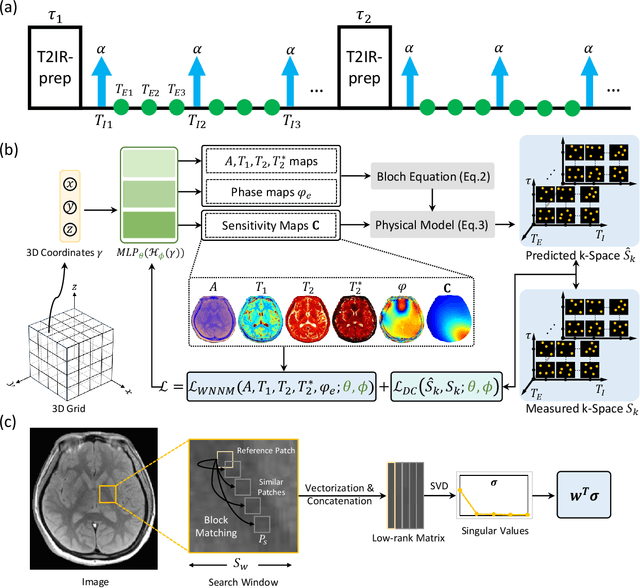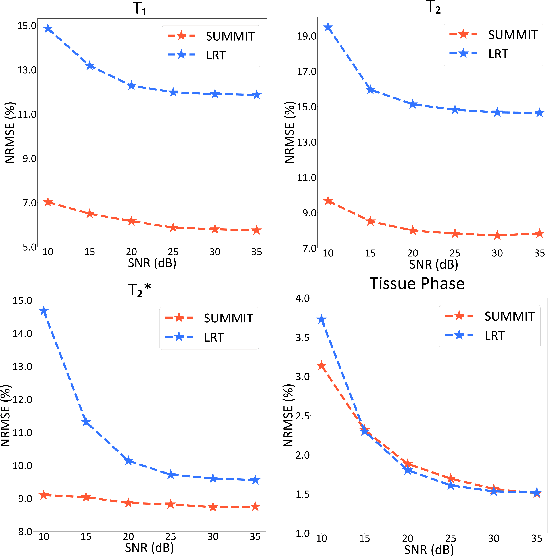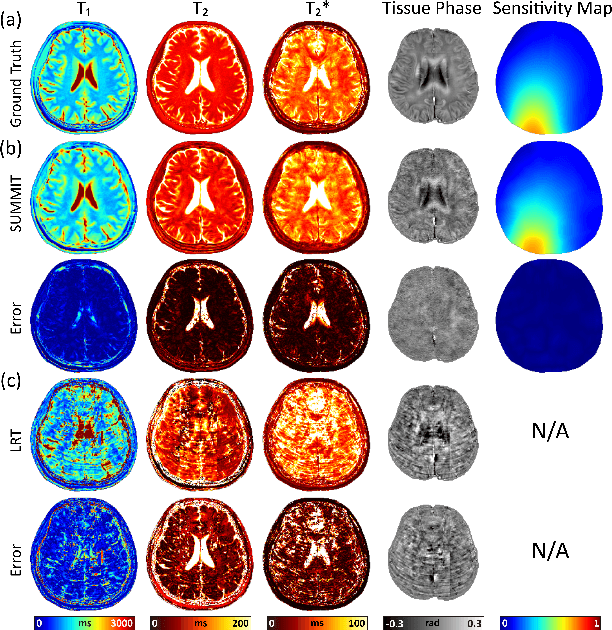Guoyan Lao
Low-Rank Augmented Implicit Neural Representation for Unsupervised High-Dimensional Quantitative MRI Reconstruction
Jun 10, 2025Abstract:Quantitative magnetic resonance imaging (qMRI) provides tissue-specific parameters vital for clinical diagnosis. Although simultaneous multi-parametric qMRI (MP-qMRI) technologies enhance imaging efficiency, robustly reconstructing qMRI from highly undersampled, high-dimensional measurements remains a significant challenge. This difficulty arises primarily because current reconstruction methods that rely solely on a single prior or physics-informed model to solve the highly ill-posed inverse problem, which often leads to suboptimal results. To overcome this limitation, we propose LoREIN, a novel unsupervised and dual-prior-integrated framework for accelerated 3D MP-qMRI reconstruction. Technically, LoREIN incorporates both low-rank prior and continuity prior via low-rank representation (LRR) and implicit neural representation (INR), respectively, to enhance reconstruction fidelity. The powerful continuous representation of INR enables the estimation of optimal spatial bases within the low-rank subspace, facilitating high-fidelity reconstruction of weighted images. Simultaneously, the predicted multi-contrast weighted images provide essential structural and quantitative guidance, further enhancing the reconstruction accuracy of quantitative parameter maps. Furthermore, our work introduces a zero-shot learning paradigm with broad potential in complex spatiotemporal and high-dimensional image reconstruction tasks, further advancing the field of medical imaging.
Coordinate-Based Neural Representation Enabling Zero-Shot Learning for 3D Multiparametric Quantitative MRI
Oct 02, 2024



Abstract:Quantitative magnetic resonance imaging (qMRI) offers tissue-specific physical parameters with significant potential for neuroscience research and clinical practice. However, lengthy scan times for 3D multiparametric qMRI acquisition limit its clinical utility. Here, we propose SUMMIT, an innovative imaging methodology that includes data acquisition and an unsupervised reconstruction for simultaneous multiparametric qMRI. SUMMIT first encodes multiple important quantitative properties into highly undersampled k-space. It further leverages implicit neural representation incorporated with a dedicated physics model to reconstruct the desired multiparametric maps without needing external training datasets. SUMMIT delivers co-registered T1, T2, T2*, and quantitative susceptibility mapping. Extensive simulations and phantom imaging demonstrate SUMMIT's high accuracy. Additionally, the proposed unsupervised approach for qMRI reconstruction also introduces a novel zero-shot learning paradigm for multiparametric imaging applicable to various medical imaging modalities.
JSMoCo: Joint Coil Sensitivity and Motion Correction in Parallel MRI with a Self-Calibrating Score-Based Diffusion Model
Oct 14, 2023



Abstract:Magnetic Resonance Imaging (MRI) stands as a powerful modality in clinical diagnosis. However, it is known that MRI faces challenges such as long acquisition time and vulnerability to motion-induced artifacts. Despite the success of many existing motion correction algorithms, there has been limited research focused on correcting motion artifacts on the estimated coil sensitivity maps for fast MRI reconstruction. Existing methods might suffer from severe performance degradation due to error propagation resulting from the inaccurate coil sensitivity maps estimation. In this work, we propose to jointly estimate the motion parameters and coil sensitivity maps for under-sampled MRI reconstruction, referred to as JSMoCo. However, joint estimation of motion parameters and coil sensitivities results in a highly ill-posed inverse problem due to an increased number of unknowns. To address this, we introduce score-based diffusion models as powerful priors and leverage the MRI physical principles to efficiently constrain the solution space for this optimization problem. Specifically, we parameterize the rigid motion as three trainable variables and model coil sensitivity maps as polynomial functions. Leveraging the physical knowledge, we then employ Gibbs sampler for joint estimation, ensuring system consistency between sensitivity maps and desired images, avoiding error propagation from pre-estimated sensitivity maps to the reconstructed images. We conduct comprehensive experiments to evaluate the performance of JSMoCo on the fastMRI dataset. The results show that our method is capable of reconstructing high-quality MRI images from sparsely-sampled k-space data, even affected by motion. It achieves this by accurately estimating both motion parameters and coil sensitivities, effectively mitigating motion-related challenges during MRI reconstruction.
 Add to Chrome
Add to Chrome Add to Firefox
Add to Firefox Add to Edge
Add to Edge